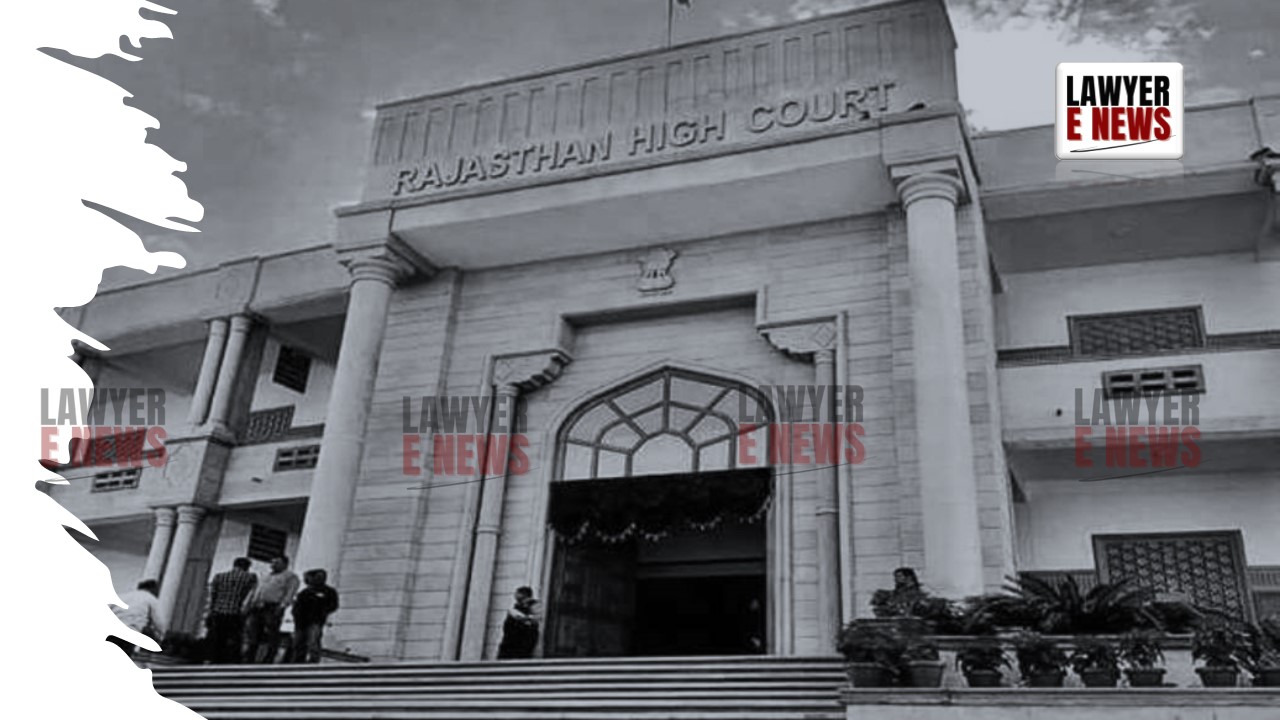-
by Admin
15 February 2026 5:01 PM



“Fraud Vitiates All Acts”: Admissions Secured by Impersonation Deemed Void - Rajasthan High Court dismissed a batch of petitions challenged the cancellation of MBBS admissions of several students accused of securing admission through fraudulent means during the Rajasthan Pre-Medical Test (RPMT) in 2009. The Court upheld the cancellation orders, observing that fraud renders all acts null and void and stating unequivocally that “principles of natural justice cannot protect a party when fraud is established.”
The Court’s decision reinforces the principle that merit must form the foundation of medical education and that fraudulent admissions severely compromise public confidence in the integrity of competitive examinations.
The controversy began when allegations surfaced that candidates in the RPMT 2009 examination had secured their admissions by using impersonators during the test. Based on these allegations, a five-member investigative committee chaired by P.K. Singh, IPS, was formed. The committee’s report, submitted in 2009, confirmed that 16 candidates were involved in impersonation, a conclusion subsequently supported by forensic analysis of thumb impressions and signatures.
Rajasthan University of Health Sciences (RUHS) canceled the admissions of the implicated students in 2011 following an FIR and internal inquiry. The petitioners, who were pursuing their MBBS degrees at the time, filed challenges against these cancellation orders, arguing that procedural irregularities and the principles of natural justice had been violated. Despite the cancellation, the petitioners were allowed to continue their studies provisionally due to interim judicial orders.
The petitioners contended that they had already completed their MBBS degrees, some had enrolled in postgraduate programs, and others were working as medical professionals. They sought protection of their qualifications and jobs on the grounds of equity and public interest.
Justice Sameer Jain unequivocally stated that fraud invalidates any act or transaction, including judicial or administrative acts. Relying on the Supreme Court’s decision in S.P. Chengalvaraya Naidu v. Jagannath & Ors. (1994) 1 SCC 1, the Court observed:
“Fraud vitiates everything. Once it is substantial that there is fraud committed by a person, no equity can be drawn in favor of such persons. The act, whether administrative or judicial, must be treated as a nullity.”
The Court dismissed the petitioners’ claim that their admissions could not be invalidated due to procedural shortcomings or lack of adherence to natural justice. “When fraud is established,” the Court observed, “the principles of natural justice are not mandatorily required to be followed.” It also cited Secretary, Andhra Pradesh Social Welfare Residential Educational Institutions v. Pindiga Sridhar (2007) 13 SCC 352, where the Supreme Court held that “fraud eclipses any requirement for issuing show cause notices.”
The petitioners argued that their long-standing reliance on their MBBS qualifications and subsequent employment should bar the cancellation of admissions. Rejecting this argument, the Court cited Nidhi Kaim v. State of Madhya Pradesh (2016) 7 SCC 615, which upheld the cancellation of admissions obtained through fraud even after ten years of study and employment.
Justice Jain noted, “When it is a case of mass cheating and the use of unfair means, cancellation of admissions, even after a lapse of a decade, is appropriate. The extraordinary jurisdiction of the High Court cannot be invoked to protect such actions.”
Emphasizing the importance of maintaining the sanctity of merit-based medical admissions, the Court observed:
“Permitting candidates who obtained admission through fraud to continue in the medical profession would fundamentally jeopardize public trust in the integrity of the merit-based selection process.”
The Court further noted that allowing such candidates to continue their studies or practice would undermine the morale of genuinely deserving candidates. It observed that the offense of impersonation “not only impacts the rights of meritorious candidates but also corrodes the ethical fabric of the medical profession, which is a noble calling.”
The Court found that the petitioners were attempting to reopen issues that had already been settled in previous judicial decisions. Referring to earlier judgments, including the single-bench decision in Bhupendra Pratap Singh Rathore v. RUHS and connected cases, the Court stated:
“The controversy regarding the cancellation of admissions has already attained finality. The principle of res judicata bars re-litigation of settled issues, and this Court cannot entertain a prayer to revisit foundational findings.”
The Court also criticized the petitioners for their delay in challenging the orders. “Delay and acquiescence preclude equitable relief,” Justice Jain stated, adding that fraud cannot be shielded by the doctrine of laches.
Justice Jain concluded that the public interest demanded the cancellation of these fraudulent admissions, even if the petitioners had completed their degrees or attained employment. He noted:
“The heinous offense of fraud in competitive examinations compromises the integrity of the process and erodes public confidence. The Court cannot allow such actions to go unchecked, as doing so would encourage future malpractices.”
The Rajasthan High Court dismissed the petitions, holding that the admissions obtained through impersonation and fraud were void ab initio. Justice Jain ruled that the cancellation of these admissions was necessary to uphold the integrity of the medical examination process and protect public interest.
The judgment reaffirmed the legal principle that “fraud vitiates everything” and clarified that procedural fairness cannot be invoked to protect acts rooted in deception. The petitions, being devoid of merit, were dismissed with no orders as to costs.
Date of Decision: December 3, 2024
